三年级下册英语(精通版)
三年级下册英语人教精通版单词表

三年级下册英语人教精通版单词表Unit 1.- cat [kæt] n.(名词)猫。
- dog [dɒɡ] n.狗。
- monkey ['mʌŋki] n.猴子。
- panda ['pændə] n.熊猫。
- duck [dʌk] n.鸭子。
- pig [pɪɡ] n.猪。
- bird [bɜːd] n.鸟。
- bear [beə(r)] n.熊。
- elephant ['elɪfənt] n.大象。
- zoo [zuː] n.动物园。
Unit 2.- big [bɪɡ] adj.(形容词)大的。
- small [smɔːl] adj.小的。
- long [lɒŋ] adj.长的。
- short [ʃɔːt] adj.短的;矮的。
- tall [tɔːl] adj.高的。
- giraffe [dʒə'rɑːf] n.长颈鹿。
Unit 3.- thin [θɪn] adj.瘦的。
- fat [fæt] adj.胖的;肥的。
- tiger ['taɪɡə(r)] n.老虎。
- lion ['laɪən] n.狮子。
- zebra ['ziːbrə] n.斑马。
- horse [hɔːs] n.马。
Unit 4.- in [ɪn] prep.(介词)在……里。
- on [ɒn] prep.在……上。
- under ['ʌndə(r)] prep.在……下面。
- chair [tʃeə(r)] n.椅子。
- desk [desk] n.书桌。
- cap [kæp] n.帽子。
- ball [bɔːl] n.球。
- car [kɑː(r)] n.汽车。
- boat [bəʊt] n.小船。
- map [mæp] n.地图。
Unit 5.- apple ['æpl] n.苹果。
三年级下册人教精通版英语书
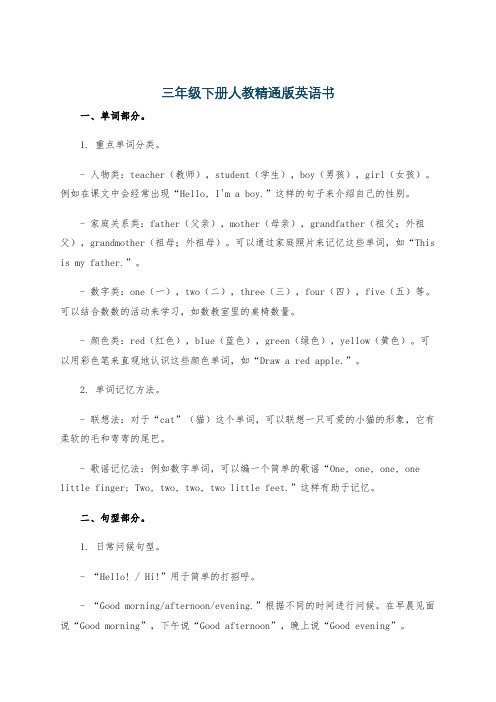
三年级下册人教精通版英语书一、单词部分。
1. 重点单词分类。
- 人物类:teacher(教师),student(学生),boy(男孩),girl(女孩)。
例如在课文中会经常出现“Hello, I'm a boy.”这样的句子来介绍自己的性别。
- 家庭关系类:father(父亲),mother(母亲),grandfather(祖父;外祖父),grandmother(祖母;外祖母)。
可以通过家庭照片来记忆这些单词,如“This is my father.”。
- 数字类:one(一),two(二),three(三),four(四),five(五)等。
可以结合数数的活动来学习,如数教室里的桌椅数量。
- 颜色类:red(红色),blue(蓝色),green(绿色),yellow(黄色)。
可以用彩色笔来直观地认识这些颜色单词,如“Draw a red apple.”。
2. 单词记忆方法。
- 联想法:对于“cat”(猫)这个单词,可以联想一只可爱的小猫的形象,它有柔软的毛和弯弯的尾巴。
- 歌谣记忆法:例如数字单词,可以编一个简单的歌谣“One, one, one, one little finger; Two, two, two, two little feet.”这样有助于记忆。
二、句型部分。
1. 日常问候句型。
- “Hello! / Hi!”用于简单的打招呼。
- “Good morning/afternoon/evening.”根据不同的时间进行问候。
在早晨见面说“Good morning”,下午说“Good afternoon”,晚上说“Good evening”。
- “How are you?”“I'm fine, thank you. And you?”这是询问对方身体状况并作出回应的基本句型。
2. 介绍句型。
- “I'm... ”用来介绍自己的名字或者身份,如“I'm Tom. I'm a student.”- “This is... ”用于介绍他人或者事物,如“This is my mother.”3. 询问事物句型。
人教精通版小学三年级下册英语课文及重点大全

人教精通版小学三年级下册英语课文及重点大全第一课 - Hello!重点:简单问候用语,如hello、hi、good morning等;名字的询问和介绍;借助图片和手势理解和表达问候的方式。
第二课 - What's This?重点:认识物体的名称,如book、pen、pencil等;通过指向物体和问答的形式熟悉物体的英文名称。
第三课 - How Many?重点:研究英文数字1-10的读音和书写;学会询问物体的数目,并能回答简单的数量问题。
第四课 - Colors重点:研究基本颜色的单词,如red、blue、yellow等;通过图片和颜色的搭配记忆颜色的英文表达。
第五课 - What's Your Name?重点:学会表达和询问姓名,如What's your name?,My name is...;通过对话练转述和回答姓名的问答。
第六课 - Numbers重点:研究数字11-20的读音和书写;通过课文中的数字和问题回答,巩固数字的认识和运用能力。
第七课 - My Day重点:研究表达时间的方式,如on Monday, on Tuesday等;学会描述自己每天的日常活动。
第八课 - My Family重点:研究家庭成员的称呼,如father、mother、brother等;通过课文对话熟悉家庭成员的英文表达。
第九课 - Happy Birthday!重点:研究生日派对的相关词汇,如cake、party、gift等;通过课文对话理解生日派对的场景描述。
第十课 - My Home重点:研究描述家居环境和家具的单词,如bedroom、kitchen、table等;通过图片和句子练家居用品的英文表达。
第十一课 - At the Zoo重点:研究动物的名称,如elephant、lion、tiger等;通过动物图片的展示,了解动物的英文表达。
第十二课 - My School重点:研究学校常见地点和设施的英文表达,如library、playground、classroom等;通过对话熟悉学校场景的英文描写。
人教精通版三年级英语下册Unit 1 Let's go to schoolLesson 1课件
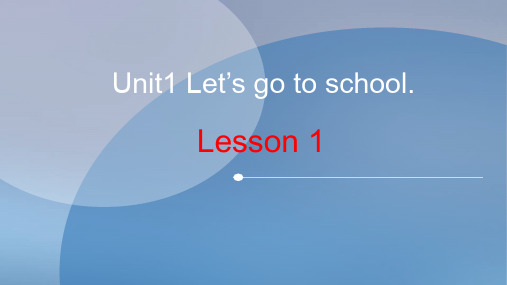
Lesson 1
教学目标
1. 能听说读写classroom 和school。
2. 能听懂、会说:Let‘s go to school. OK. Let’s go. 并能在实际生活中运用。
3. 学唱英文歌曲Let’s go to school.
Lead-in
老师在讲课时,会对同学们说…
Hi! Let’s look at the blackboard.
Practice
你会用Let’s…造句吗?
LLeett’s’sgdofrltyaowcsklcaihatseoso.rpol.aomnd. a .
Consolidation
看图复述对话
Hello, Kate! Nice to see you again.
活动1 看图选择单词
A: sharpener B: school
A: classroom B: class
Presentation
Questions:.
1.Who are they? 2.Where are they going? 3.What are they talking about?
Choose
新学期开始了,同学们会用英语相互问候吗?
Presentation
NHiecleloyt,ooDum!aveee!t
NHiyceoelulto,o,tomSoae!met!
Presentation
How are Hyoi, uL?ily!
பைடு நூலகம்
FinHei,, TAhmayn!k you!
Hello, dog. Nice to meet you.
人教精通版英语三年级下册全册单元知识点归纳与整理
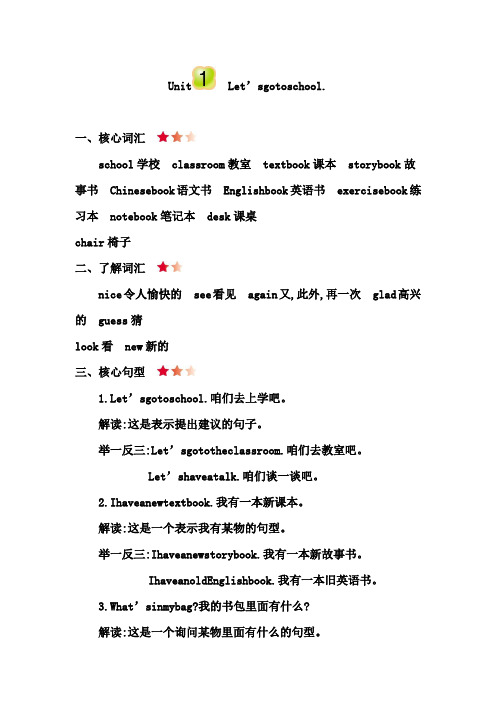
Unit Let’sgotoschool.一、核心词汇school学校classroom教室textbook课本storybook故事书Chinesebook语文书Englishbook英语书exercisebook练习本notebook笔记本desk课桌chair椅子二、了解词汇nice令人愉快的see看见again又,此外,再一次glad高兴的guess猜look看new新的三、核心句型1.Let’sgotoschool.咱们去上学吧。
解读:这是表示提出建议的句子。
举一反三:Let’sgototheclassroom.咱们去教室吧。
Let’shaveatalk.咱们谈一谈吧。
2.Ihaveanewtextbook.我有一本新课本。
解读:这是一个表示我有某物的句型。
举一反三:Ihaveanewstorybook.我有一本新故事书。
IhaveanoldEnglishbook.我有一本旧英语书。
3.What’sinmybag?我的书包里面有什么?解读:这是一个询问某物里面有什么的句型。
举一反三:—What’sinyourhand?你的手里有什么?—AChinesebookandanEnglishbook.一本语文书和一本英语书。
—What’sinmypencil-box?我的铅笔盒里面有什么?—Somepencils.一些铅笔。
4.What’sonthechair?椅子上面有什么?解读:这是一个询问某物上面有什么的句型。
举一反三:What’sonthebed?床上面有什么?What’sonmydesk?我的课桌上面有什么?四、了解句型1.Nicetoseeyouagain.很高兴再次见到你。
解读:这是一个常见的打招呼用语。
句中的again表示“再次”。
举一反三:Pleasedtoseeyou.见到你很高兴。
Gladtomeetyou.见到你很高兴。
2.—CanIseeit?我能看一下吗?—Sure.当然可以。
完整版精通版小学三年级英语下册
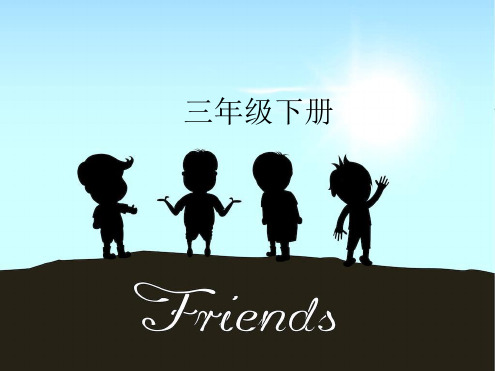
三年级下册
? school [sku?l]学校
? classroom [‘klɑ?sru?m教]室
?
textbook [‘teks(t)b?k]
课本,教科书
?
storybook [‘st??r?b?k]
故事书,小说
?
Chinese book [,t?ai‘ni:z]
语文书
? eg.This is a dress. ? This is a nice dress. ? This is my cat. ? …… ? This is my mother. ? This is my father. ? That's my uncle. ? That 's my aunt.
? He is my grandpa. ? He 's my grandpa. ? She is my grandma. ? She's my grandma. ? She 's my sister. ? He 's my brother.
Lesson14
? Hello,Sam! ? How old are you? ? Hi,Yang Ming. ? This is my brother,Sam. ? I'm six.
Lesson15
? Hi,Miss Wu. ? This is my son. ? Hello,what's your name? ? My name 's Gao Wei. ? How old are you? ? I'm eight.
Lesson6
? Hello,Monkey! Nice to see you again. ? Hi ,Cat. ? Hi ! I have a new bag. ? Look! I have a new textbook. ? Can I see it. Here you are. ? Let's go to school .Oh!What's in my bag. ? A story book,a Chinese book ,an English
精通版三年级英语下册I'm in Class One,Grade Three课件
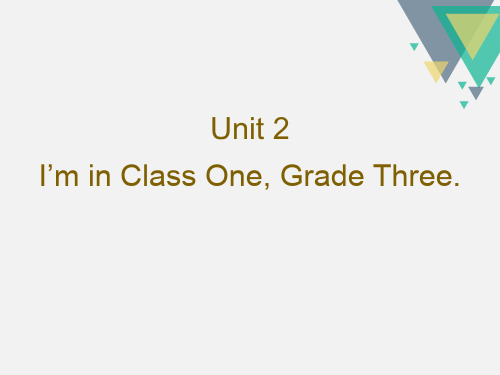
Let’s read
A: Hello, I’m Li Yan, I’m in Class One. B: Hi, my name is Ann, I’m in Class Two. A: Pleased to meet you. B: Pleased to meet you, too.
Unit 2 I’m in Class One, Grade Three.
Let’s learn
one 一
two 二
three 三
_________ bird. one
_________ fishes. two
_________ flowers. three
Let’s learn Li Yan: What’s your name?
A: _______________? B: My name is Jack, I’m in _____________.
What’s your name? Class Two
A: _______________? B: My name is Lucy, I’m in _____________.
Let’s talk
介绍自己的名字和班级给大家听 My name is ….I'm in …..
Homework:
1.熟读本课对话; 2.抄写本课重点单词3遍。
I’m in Class One, Grade Three.
第1课时
Exercise 练习
1. I have B English book. A. a B. an C. the
你叫什么名字?
Ann: My name is Ann, I’m in Class Two.
人教精通版英语单词,三年级下册

人教精通版三年级英语下册-三年级起点单词列表、例句汇总共包含6个学习单元,62单词Unit 1(10个单词)我要去学校。
·school英[sku:l] / n.学校I''m going to the school.(我要去学校。
)·classroom英[klɑ:sru:m] / n.教室,课堂Maybe he is in the classroom.(他可能在教室里。
)·textbook英[tekstbk] / n.教材;教科书;课本She wrote a textbook on international law.(她写了本国际法教材。
)·storybook英[st:ribk] / n.故事书,小说Look, I have a new storybook.(看,我有一本新的故事书。
)·Chinese book英[tani:z buk] / n.语文书This is a Chinese book.(这是一本语文书。
)·English book英[gl buk] / n.英语书There is a vocabulary at the back of our English book.(我们英语课本的后面附有词汇表。
)·exercise book英[eks buk] / n.练习本I want this exercise book.(我想要这本练习本。
)·notebook英[ntbk] / n.笔记本He copied the data into a notebook.(他将数据抄在一个笔记本上。
)·desk英[desk] / n.书桌On the desk.(在课桌上。
)·chair英[te(r)] / n.椅子Put your schoolbag on the chair.(把你的书包放在椅子上。
三年级下册精通版英语单词表

精通版三年级下册英语单词表Unit 1
单词:
1.spring 春天
2.summer 夏天
3.autumn 秋天
4.winter 冬天
5.season 季节
短语:
1.in spring 在春天
2.in summer 在夏天
3.in autumn 在秋天
4.in winter 在冬天Unit 2
单词:
1.warm 温暖的
2.hot 炎热的
3.cool 凉爽的
4.cold 寒冷的
5.favourite 最喜欢的
6.best 最喜欢的
短语:
1.my favourite season 我最喜欢的季节
2.the best season 最好的季节
3.the warmest day 最暖和的一天
4.the coldest day 最寒冷的一天
Unit 3
单词:
1.like 像,喜欢
2.dislike 不喜欢,讨厌
3.love 喜欢,爱
4.enjoy 享受,喜爱
5.happy 快乐的,高兴的
6.sad 伤心的,难过的
7.feel 感觉,觉得
8.try 尝试,试图
9.learn 学习,学会
10.song 歌曲,歌唱
11.music 音乐,乐曲
12.instrument 乐器,器具
13.party 聚会,派对
14.game 游戏,竞赛
15.story 故事,小说
16.word 字,词,单词
17.letter 字母,信件
18.game 游戏,比赛
19.draw 画画,拉拔,拔河。
人教精通版小学英语三年级下册单词表(分单元含音标)
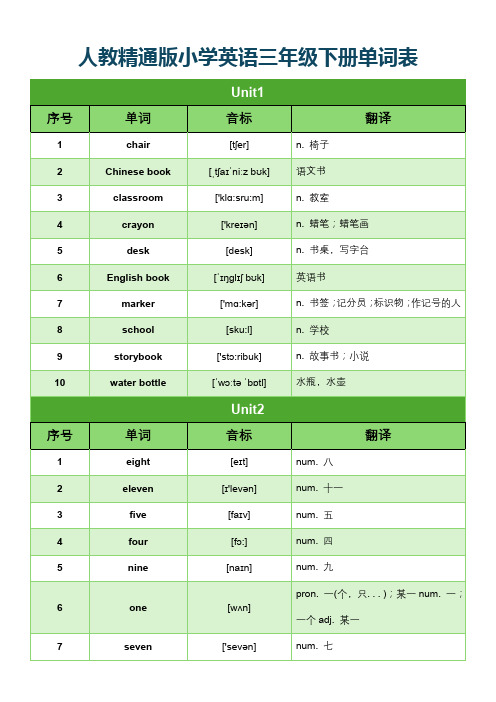
序号
单词
音标
翻译
1
box
[bɒks]
n.盒子,箱子
2
coat
[kəʊt]
n.外套vt.覆盖…的表面
3
skirt
[skɜ:t]
n.女裙
4
sweater
['swetə]
n.厚运动衫,毛衣
5
T-shirt
['ti:ʃɜ:t]
n. T恤衫;短袖无领汗衫
6
uniform
['ju:nifɔ:m]
n.制服
['ais'kri:m]
n.冰淇淋
9
jam
[dʒæm]
n.果酱;阻塞
10
mango
['mæŋɡəu]
n.芒果
序号
单词
音标
翻译
1
elephant
['elɪfənt]
n.象
2
kangaroo
[,kæŋgə'ru:]
n.袋鼠,大袋鼠
3
lion
['laɪən]
n.狮子
4
mosquito
[məs'ki:təu]
序号
单词
音标
翻译
1
bread
[bred]
n.面包
2
candy
['kændi]
n.糖果
3
coffee
['kɔfi]
n.咖啡
4
doughnut
['dəunʌt]
n. [计]圆环图;油炸圈饼
5
fruit
[fru:t]
n.水果;果实
精通三年级英语(下)【第一单元】
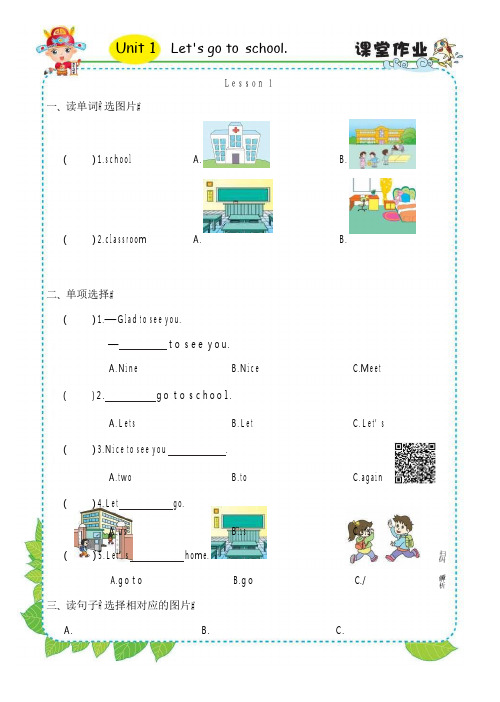
码 解 析 Unit 1 Let's go to school.Lesson 1一、读单词ꎬ选图片ꎮ()1.school A. B.()2.classroom A. B.二、单项选择ꎮ( )1.—Glad to see you.—to see you. A.NineB.Nice C.Meet ( )2.go to school. A.LetsB.Let C.Let’ s ( )3.Nice to see you. A.twoB.to C.again ( )4.Letgo. A.usB.is C.its ( )5.Let’ shome. 扫 A.go toB.go C. / 看 三、读句子ꎬ选择相对应的图片ꎮA.B. C.( )1.Nicetoseeyouagain. ()2.Let’sgotoschool.( )3.Let’sgototheclassroom.129Lesson2一、读单词ꎬ选图片ꎮ( )1.textbookA.B.( )2.storybookA.B.二、单项选择ꎮ( )1.Iapencil.A.isB.hasC.have( )2.Tomatextbook.A.hasB.isC.have( )3.—Iseeyourbook?—Sure.A.CanB.AmC.Do( )4.Ihaveapple.A. /B.aC.an( )5.—Ilikeapples.—Me.A.twoB.tooC.to三、读句子ꎬ判断下列对话或句子与所给图片是( T) 否( F) 相符ꎮ( )1.—CanIseeyournewbook?—Sure.Hereyouare. ()2.Ihaveatextbook.( )3.—Ihaveastorybook.—Metoo! ( )4.Ihavearuler.130Lesson3一、读词汇ꎬ选图片ꎮ( )1.ChinesebookA.B.( )2.EnglishbookA.B.二、单项选择ꎮ( )1.—inyourbag?—Atextbook.A.WhereB.What’sC.What( )2.IhaveEnglishbookinmybag.A.anB.aC. / ( )3.appleandbananaareinmyhand.A.AnꎬanB.AnꎬaC.Aꎬan( )4.Look! Ihavethreeinmybag.A.EnglishbookB.ChinesebookC.Chinesebooks三、读对话ꎬ画出对话中提到的物品ꎮA:HiꎬLucy.Guessꎬwhat’sinmybag? B:AnotebookandanEnglishbook? A:Yes.B:Andtwopensandaruler? A:No.Twopencilsandaruler.131Lesson4一、读词汇ꎬ选图片ꎮ( )1.exercisebookA.B.( )2.notebookA.B.二、单项选择ꎮ( )1.Thisisexercisebook.A.anB.aC. / ( )2.—anotebook?—No.It’saChinesebook.A.It’sB.IsitC.Itis( )3.—What’smybag?—Threenotebooks.A.atB.onC.in( )4.Thisisdesk.A.youB.myC.me三、仿照例句ꎬ根据所给图片编写对话ꎮ例:A:What’sinmypencilbox? B:Twopencilsandaneraser.1.A:B:2.A:B:132Lesson5一、读单词ꎬ选图片ꎮ( )1.deskA.B.( )2.chairA.B.二、单项选择ꎮ( )1.—What’sthechair?—Astorybook.A.toB.onC.in( )2.—ꎬMike!—GoodmorningꎬJohn!A.GoodmorningB.GoodafternoonC.Goodnight( )3.—onthedesk?—Amarker.A.What’sB.WhatC.It’s三、选出正确的译文ꎮ( )1.课桌上有什么?A.What’sonthedesk? B.What’sonthechair? ( )2.我有一本新语文书ꎮA.IhaveanewChinesebook. B.IhaveanewEnglishbook.( )3.早上好!A.Goodmorning! B.Goodafternoon! ()4.我可以看一看吗?A.CanIseeit? B.Hereyouare. ( )5.书包里有什么?A.What’sinthepencil ̄box? B.What’sinthebag?133一、将图片与单词连线ꎮLesson 61.2.3.4.A.desk B.classroom C.school D.Chinese book二、情景交际ꎮ()1.开学了ꎬ你再次见到你的小伙伴时ꎬ应该说:A.What’ s your name? B.Nice to see you again. C.How are you?邀请同学一起走ꎬ你可以说: A.Let’ s go.B.Let me go.C.Let’ s play.早上你想和 Lily 一起去上学ꎬ应该说: A.Let’ s go to the classroom. B.Let’ s go home. C.Let’ s go to school.你想表达自己拥有一本新英语书ꎬ应该说: A.I have a new English book. B.I have an English book. C.I have a new Chinese book.三、看图片ꎬ编写对话ꎮ1.A:( )2.()3. ()4.B:2.A:B:134( 时间:40分钟)优秀良好合格一、听录音ꎬ给下列图片排序ꎮ每小题听一遍ꎮ (10分)Unit1检测卷( 满分:100分)( ) 3.A.AnEnglishbook.B.Let’sgototheclassroom. C.Thankyouverymuch.( ) 4.A.HelloꎬYangMing.B.Look! Ihaveanewstorybook. C.Sure.Hereyouare.( ) 5.A.No.It’sanexercisebook.B.Hereyouare.C.IhaveanEnglishbook.二、听录音ꎬ判断下列图片与句子是( T)四、看图片ꎬ选单词或短语ꎮ (10分) 否(F)相符ꎮ每小题听两遍ꎮ (10分)A.exercisebookB.schoolC.deskD.classroomE.Chinesebook三、听录音ꎬ选出正确的应答语ꎮ每小题听两遍ꎮ (10分)( )1.A.Let’sgotoschool.B.OK.Let’sgo! C.Nicetomeetyou.( )2.A.Nicetomeetyou.B.Hello!C.Gladtomeetyouagain.五、找出不属于同一类的单词或短语ꎮ (10分)( )1.A.inB.onC.desk( )2.A.ChinesebookB.chairC.textbook135码 解( )3.A.glad B.schoolC.classroom( )4.A.morning B.afternoonC.good( )5.A.robot B.deskC.chair六、单项选择ꎮ (15 分) ()1.Look! I have newEnglish book. A.aB.anC. /()2.—I have a ruler. — too! A.My B.IC.Me()3.—HiꎬJohn! Nice to see you again. —HiꎬMike! toyou again.( )2.Can I see the ?A.Chinese book B.textbook()3.Let’ s go to.A.schoolB.classroom()4.What’ s on the? A.chairB.desk ()5.Look! It’ s an.A.English book B.exercise bookA.Niceꎬlook 扫 B.Gladꎬmeet 看 C.Goodꎬlook( )4.—Gao Weiꎬlet go toschool. —OK. A.usB.is C.its( )5.— I see it?—Sure. A.AmB.Do C.Can七、看图ꎬ选单词ꎮ (15 分) ()1.Look at the.析八、读句子ꎬ选择与句意相符的图片ꎮ(20分)( )1.Let’sgotoschool.( )2.Ihaveapencilinmybag.( )3.Arulerandapencilareinthebag.( )4.Look! Apencilandtwobooksareonthedesk.( ) 5.GoodmorningꎬLucy! Nicetoseeyouagain.136A.markerB.bag。
[全]人教精通版三年级英语下册朗读+知识点总结
![[全]人教精通版三年级英语下册朗读+知识点总结](https://img.taocdn.com/s3/m/d75a26df6c85ec3a86c2c53b.png)
人教精通版三年级英语下册朗读+知识点总结全册单词表1Unit 1school 学校classroom 教室textbook 课本storybook 故事书Chinese book 语文书English book 英语书exercise book 练习本notebook 笔记本desk 桌子chair 椅子2Unit 2one 一two 二four 四five 五six 六seve 七eight 八nine 九ten 十elev 十一twelve 十二3Unit 3father(dad) 爸爸mother(mum) 妈妈brother 兄弟sister 姐妹daughter 女儿grandfather 祖父grandmother 祖母uncle 叔叔aunt 阿姨4Unit 4mango 芒果bread 面包candy 糖果doughnut 面包圈coffee 咖啡fruit 水果grapes 葡萄honey 蜜糖ice cream 冰淇淋jam 果酱5Unit 5 kangaroo 袋鼠lion 狮子nest 鸟巢owl 老鹰parrot 鹦鹉quail 鹌鹑rooster 公鸡elephant 大象tiger 老虎6Unit 6skirt 裙子T-shirt T恤uniform 制服vest 背心watch 手表box 盒子yacht 帆船zip 拉链zebra 斑马coat 外套sweater 毛衣知识点总结Unit 1 Let’s go to school.【词汇】school 学校classroom 教室textbook 课本storybook 故事书Chinese book 语文书English book 英语书exercise book 练习册notebook 笔记本desk 书桌chair 椅子【句型】1. Nice to see you again. 很高兴再次见到你。
2. Glad to see you again. 很高兴再次见到你。
人教精通版三年级英语下册全册知识点清单汇总
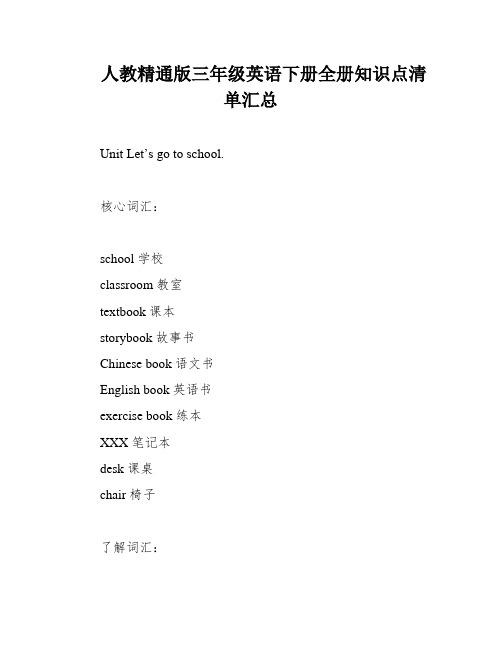
人教精通版三年级英语下册全册知识点清单汇总Unit Let’s go to school.核心词汇:school 学校classroom 教室textbook 课本storybook 故事书Chinese book 语文书English book 英语书exercise book 练本XXX 笔记本desk 课桌chair 椅子了解词汇:XXX 令人愉快的see 看见again 又,此外,再一次glad 高兴的guess 猜look 看new 新的核心句型:1.Let’s go to school。
咱们去上学吧。
这是表示提出建议的句子。
举一反三:Let’s go to the classroom。
咱们去教室吧。
Let’s have a XXX。
咱们谈一谈吧。
2.I have a XXX 我有一本新课本。
这是一个表示我有某物的句型。
举一反三:I have a XXX 我有一本新故事书。
I have an old English book。
我有一本旧英语书。
3.XXX。
我的书包里面有什么?这是一个询问某物里面有什么的句型。
举一反三:- What’s in your hand。
你的手里有什么?A Chinese book and an English book。
一本语文书和一本英语书。
What’s in my pencil-box。
我的铅笔盒里面有什么?Some pencils。
一些铅笔。
4.What’s on the chair。
椅子上面有什么?这是一个询问某物上面有什么的句型。
举一反三:What’s on the bed。
床上面有什么?XXX。
我的课桌上面有什么?了解句型:1.Nice to see you again。
很高兴再次见到你。
这是一个常见的打招呼用语。
句中的again表示“再次”。
举一反三:Pleased to see you。
见到你很高兴。
XXX。
见到你很高兴。
2.- Can I see it。
三年级下册人教精通版英语单词表
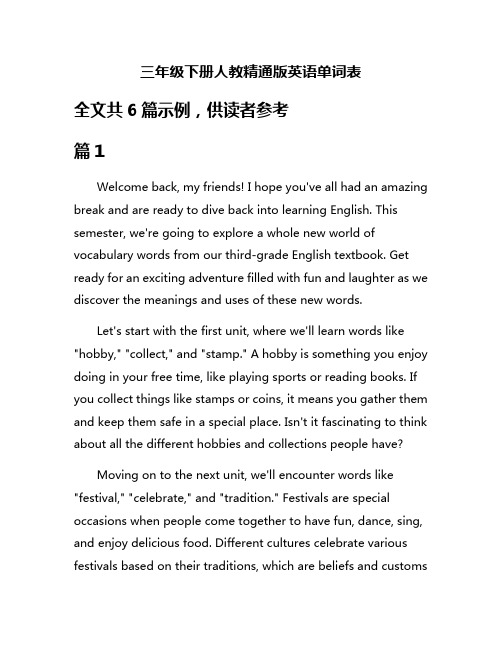
三年级下册人教精通版英语单词表全文共6篇示例,供读者参考篇1Welcome back, my friends! I hope you've all had an amazing break and are ready to dive back into learning English. This semester, we're going to explore a whole new world of vocabulary words from our third-grade English textbook. Get ready for an exciting adventure filled with fun and laughter as we discover the meanings and uses of these new words.Let's start with the first unit, where we'll learn words like "hobby," "collect," and "stamp." A hobby is something you enjoy doing in your free time, like playing sports or reading books. If you collect things like stamps or coins, it means you gather them and keep them safe in a special place. Isn't it fascinating to think about all the different hobbies and collections people have?Moving on to the next unit, we'll encounter words like "festival," "celebrate," and "tradition." Festivals are special occasions when people come together to have fun, dance, sing, and enjoy delicious food. Different cultures celebrate various festivals based on their traditions, which are beliefs and customspassed down from generation to generation. Can you think of any festivals or traditions celebrated in your family or community?In the third unit, we'll explore words related to animals, such as "fur," "feather," and "scale." Fur is the soft, hairy coat that covers the bodies of animals like cats and dogs. Feathers are the light, fluffy coverings that birds have on their bodies, which help them fly. Scales, on the other hand, are the hard, flat plates that cover the bodies of fish and reptiles like snakes. Isn't it fascinating to learn about the different characteristics of animals?As we move through the units, we'll encounter more exciting words like "recycle," "pollution," "environment," "healthy," "exercise," and "energy." These words will teach us about taking care of our planet, staying fit and active, and making wise choices for our well-being.But that's not all! We'll also learn words related to different occupations, such as "doctor," "teacher," "chef," and "scientist." These words will help us understand the important roles people play in our communities and the various skills and knowledge required for different jobs.Throughout our journey, we'll play games, sing songs, and engage in fun activities to help us remember and use these new words. We'll practice them in conversations, stories, androle-plays, making learning English an enjoyable and interactive experience.Remember, learning new vocabulary words is like unlocking a treasure chest filled with the keys to understanding and communicating in English. Each word you learn will open up new doors and help you express yourself more clearly and confidently.So, let's embark on this exciting adventure together, my friends! Get ready to expand your vocabularies, broaden your horizons, and have a blast while doing it. The world of English is waiting for us, and with every new word we learn, we'll become stronger and more capable communicators.See you in class, and happy learning!篇2Learning New Words is Fun!Hi there! My name is Lily and I'm a 3rd grade student. I love learning English and this semester we got a new Englishtextbook with lots of cool new words to learn. Our teacher says that building up our vocabulary is super important for becoming fluent in English. At first, I was a bit nervous about having to memorize so many new words, but my teacher makes it really fun and easy. Let me tell you about some of the awesome new words we've learned!One of the first new words was "subject". It means a topic that you study, like math, science, or English itself. My favorite subject is art because I love drawing and painting. Another great word is "resource". A resource is something that provides what you need, like water is a natural resource that we can't live without. The textbook and dictionary are also resources that help us learn.We learned the word "community" which means a group of people living together in one place or area. Our classroom is a little community where we all study and play together. The bigger community is our whole school and neighborhood. I really like my community!Some other useful words are "culture", "region", "energy", and "industry". Culture refers to the customs, beliefs, arts, and way of life of a group of people. China has a very ancient and rich culture. A region is a particular area, like the region I live in getsquite cold in the winter. Energy gives us the ability to be active and get things done. The sun provides energy that allows plants to grow. And an industry is a particular kind of manufacturing or trade, like the car industry.This textbook also taught me words related to transportation like "transfer", "destination", "delay", and "depart". To transfer means to move from one place to another. When we go on vacation, we sometimes have to transfer between trains or planes. Our destination is where we're traveling to. Nobody likes delays when there's heavy traffic or bad weather slowing us down. And depart means to go away from a place, like when we depart from home to go to school each morning.One chapter was all about technology words such as "software", "network", "technical", and "digital". Software is the programs and operating information for a computer. A network connects multiple computers together. Something technical has to do with specialized knowledge and equipment. And digital is about using data made up of codes like 0s and 1s for computers and other modern technologies.I learned lots of useful adjectives too, like "permanent", "artificial", "mature", "ethnic", and "constant". Permanent means lasting forever without any change. My baby sister isn'tpermanent - she keeps growing bigger every day! Artificial is the opposite of natural, like artificial flavors or artificial flowers. Mature means being fully developed, like a mature adult instead of a child. Ethnic has to do with the cultures and customs of different peoples and races. And constant means never stopping or unchanging, like how my little brother's crying sometimes feels constant.You're probably wondering what some of the other new words are that I've learned this semester. Well, let me go through a few more for you! There's "tradition", which refers to the old customs and beliefs that people follow from generation to generation in their culture and community. Like many Chinese families have traditions for celebrating holidays like the Spring Festival."Philosophy" is an interesting word that means the study of knowledge, truth, and moral principles. I'm not sure I fully understand philosophy yet, but our teacher says it will help us think more deeply about important questions as we get older.Then there's "volunteer" which can be either a verb meaning to offer to do something without being paid, or a noun referring to someone who volunteers their time to help others. My parentssometimes volunteer at a local food bank to assist families in need.The word "generate" means to produce or create something.A power plant generates the electricity we use every day. And wind turbines generate renewable energy in an environmentally-friendly way.We also learned "identity", which is who or what someone or something fundamentally is. My identity includes being a Chinese citizen, a student, a big sister, and many other roles and characteristics that make me who I am.Oh, and I can't forget about "atmosphere"! It literally means the air around the Earth, but it can also mean the overall feeling or mood of a particular environment or situation. Like a cheerful atmosphere in a classroom where everyone is happy and engaged in learning.There are so many more awesome vocabulary words I've picked up in my 3rd grade English lessons this semester. Words like "occasion", "contribution", "internal", "external", "influence", "convince", and "insist" to name just a few. I'm proud of how much my English skills are improving!Learning all these new words really makes me feel like I'm expanding my knowledge of the world around me. Each new word opens a door to deeper understanding of different ideas, cultures, and ways of looking at things. It's amazing how just a simple vocabulary word can give you a whole new perspective.My teacher always reminds us that words are powerful tools. The more words we know, the better we can communicate, analyze information, and express ourselves precisely. That's why building up our vocabulary is so crucial for not just learning English, but for our overall education and growth as young students.Sometimes memorizing definitions can feel a bit tedious, I'll admit. But our teacher uses fun games, songs, picture associations and other creative methods to make it much more engaging and help the words really stick in our minds. Plus, seeing how these new words connect to our everyday lives makes the lessons feel meaningful and purposeful.I'm so excited to continue learning more and more new English vocabulary words throughout the rest of 3rd grade and beyond. Who knows how many thousands of words I'll have mastered by the time I'm an adult? The world of languages is fascinating, and being multilingual will open up incredibleopportunities for me to connect with different people and cultures across the globe someday.Well, those are some of my thoughts on learning new English vocabulary as a 3rd grader. I hope you enjoyed hearing about the awesome words I'm adding to my personal dictionary! Studying certainly has its challenges, but gaining knowledge is one of the most rewarding experiences we can have. I feel so lucky to be a student, and I'm going to keep working hard, staying curious, and having fun along the way. Thanks for reading, and happy learning!篇3Vocabulary Words Are My FriendsHi there! My name is Emma and I'm a 3rd grader. I absolutely love learning new vocabulary words in English class. Every time we start a new unit, I get so excited to see what cool new words we'll be adding to our collection.To me, vocabulary words are like little friends that join my brain and help me express myself better. The more words I know, the more I can say exactly what I mean. It's like having a huge colored pencil box instead of just a few crayons - I can draw so many more pictures and details with all those pencils!Some of my favorite words from this semester have been "scramble", "investigate", and "generosity". Scramble is such a fun word to say, and it paints a clear picture in my mind of getting all mixed up and moving quickly. Like when my baby brother scrambles across the floor after a toy. Investigate is a word that makes me feel like a real detective, searching for clues and uncovering the truth. I love reading mystery books, so getting to investigate different topics in school is thrilling.Generosity might just be the most beautiful word we've learned. It represents being kind, giving, and thinking of others before yourself. Whenever I practice generosity by sharing my snacks or including everyone at recess, it makes my heart feel warm and happy. I want to be a generosity inspector, going around looking for generous acts to celebrate!In our recent science unit, we learned lots of fascinating vocabulary about the natural world. "Habitat" is the place where a plant or animal lives and gets what it needs to survive. A forest could be a habitat for bears, raccoons, and oak trees. A "life cycle" describes the series of changes that living things go through as they grow and develop. It's amazing to think about how different a butterfly looks from when it was just a tiny egg! The life cycle of plants includes the seed sprouting, growingroots and stems, blooming flowers, and producing more seeds to start the cycle over again. I'm in awe of the generosity of plants, creating oxygen for us to breathe as well as delicious fruits and vegetables.Do you know what "energy" means? It's what allows us to be active, move, and get things done! We get energy from the food we eat. The sun's energy helps plants grow through photosynthesis. Different forms of energy include light, heat, motion, electricity and sound. I have a lot of kinetic energy (energy of motion) at recess when I'm running around with my friends! We learned about different "sources" of energy too - some come from nature like wind, water and the sun. Other energy sources are called "non-renewable" because they'll run out someday, like coal, oil and natural gas. I sure hope we can find more renewable energy sources that are better for the environment.Speaking of the environment, we talked about "pollution" - substances that contaminate the air, water or soil and can make people sick. Throwing trash on the ground, smoke from factories, and oil spills all cause pollution. It makes me so sad to think about animals getting hurt by plastic litter or oil spills in the ocean. I really want to be an "environmentalist" when I grow up,someone who protects the natural world from pollution and habitats from being destroyed.We read some wonderful stories featuring "courageous" characters who were brave in facing their fears. Courage means having strength in the face of pain or danger. In one story, a courageous girl stood up to a bully who was teasing her friend. In another, a firefighter courageously rescued people trapped in a burning building. Often we have to feel "determined" (firmly committed to a goal) in order to act courageously, just pushing through our worries or doubts. I try to be courageous about speaking up in class, even when I'm a little nervous to raise my hand. My goal is to keep building my courage.Those are just some of the amazing words I've absorbed this semester like a sponge. I have a special vocabulary journal where I write down new words, their definitions, and sample sentences using them. I'll decorate the pages with little doodles to help me remember what each word means. For example, I might draw a firefighter carrying someone for "courageous" or a recycling symbol for "environmentalist".My brain is like a blossoming flower, opening up petal by petal to all this new knowledge. The more vocabulary words I collect, the brighter and more beautiful my mind becomes.Pretty soon I'll be the one teaching my parents new wordsthey've never heard before! I feel so lucky to be learning and growing with the help of all my wonderful new word friends.篇4My Amazing Journey with the Third Grade English Word ListHi everyone! My name is Lily, and I'm in the third grade. Today, I want to share with you all about my amazing journey with the English word list from our textbook. It has been so much fun learning new words and using them in my daily life.Let's start with the first unit. In this unit, we learned words related to family, such as 'father', 'mother', 'brother', and 'sister'. It was exciting to talk about my family using these words. I introduced my family members to my classmates and even practiced speaking English with them.Moving on to the second unit, we explored words about food. Yummy! I learned words like 'apple', 'banana', 'cake', and 'pizza'. It made me hungry just thinking about all these delicious foods. Whenever I went to a restaurant with my family, I tried my best to order my favorite dishes in English. It was a great way to practice the new words.In the third unit, we discovered words related to animals. I love animals, so this unit was super exciting for me. I learned words like 'dog', 'cat', 'lion', and 'elephant'. I even made flashcards with pictures of different animals and their names in English. It was so much fun playing memory games with these cards and trying to remember all the animal names.Next, we delved into words about transportation in the fourth unit. I learned words like 'car', 'bus', 'train', and 'bicycle'. It was fascinating to learn about different ways people travel around. Whenever I went on a trip with my family, I would point out the different vehicles and say their names in English. It made me feel like a little explorer!The fifth unit focused on words related to nature. I learned words like 'tree', 'flower', 'sun', and 'rain'. I enjoyed going on nature walks with my friends and pointing out all the beautiful things around us. I even started keeping a nature journal where I would write the English names of the things I saw. It made me appreciate nature even more.Finally, in the last unit, we explored words about clothes. I learned words like 'shirt', 'pants', 'shoes', and 'hat'. Dressing up became so much more fun when I could talk about my outfit in English. I would stand in front of the mirror and describe what Iwas wearing using the new words I learned. It made me feel like a little fashionista!Throughout this incredible journey, I have not only learned new words but also gained confidence in speaking English. I'm no longer afraid to try and express myself in this language. I have also made new friends who are also learning English, and we often have conversations using the words from our word list.Learning English has opened up a whole new world for me. I can now communicate with people from different countries and understand things I couldn't before. I'm so grateful for the opportunity to learn and grow.I hope you enjoyed hearing about my journey with the third-grade English word list. Remember, learning new words can be so much fun, just like going on an adventure. Keep exploring and never stop learning!Bye for now!Love,LilyP.S. If you're also learning English, don't give up! Practice every day, and soon you'll be amazed at how much you can achieve.篇5My Big English WordsEnglish class is my favorite part of school! I love learning new words and seeing how many big English words I can master. My teacher gives us lists of vocabulary words to learn for each unit. At first, some of the words seem really long and complicated. But once I practice them and learn what they mean, I feel so proud that I can read and use such grown-up words!Last week, we started a new unit all about animals. The first word on the list was "mammal." That's a kind of animal that is warm-blooded and feeds its babies milk from the mother's body. Cows, dogs, and even whales are all mammals! Next was "reptile" which are cold-blooded animals that lay eggs, like snakes and lizards. I thought reptiles would be scared of mammals, but my teacher said they actually make good pets for each other sometimes.Some of the vocabulary words were verbs, which are words that describe actions. "Hibernate" means to sleep very deeply during the winter to save energy when there isn't much food around. Bears do this, as well as some other animals. To "migrate" is to travel long distances, usually because of changesin the seasons. Many birds migrate in the winter to escape the cold. It's incredible that tiny animals can fly thousands of miles!Other words described animal behaviors, like "nocturnal" which means being awake at night and asleep during the day. Owls and bats are two nocturnal creatures. The word "camouflage" means having colors or shapes that help an animal blend into its surroundings and hide from predators. I thought it was so clever how nature gave certain animals thisprotectiveability.Some of the coolest words were really long but fun to say, like "invertebrate" which means an animal without a backbone or spine. Earthworms, jellyfish, and insects are all invertebrates. Or "metamorphosis" which is theamazing process some animals go through, completely changing their body structure as they grow up. Caterpillars metamorphosizing into beautiful butterflies is one amazing example.While a lot of the vocabulary focused on animals themselves, some words described where animals live, like their "habitat." A habitat is the natural environment an animal is best suited to live in, with the right sources of food, water, and shelter. If an animal's habitat gets damaged or destroyed, it puts the whole species at risk of becoming "endangered" or even "extinct."Looking back on all the big words I tackled for this animal unit, I feel like areal champion! My favorite word might be "naturalist" which means someone who studies plants and animals in nature. I want to be a naturalist when I grow up to learn everything I can about the amazing creatures of our world.For our next unit, we're going to be learning vocabulary about weather and the environment. I can't wait to see what new exciting words are in store! Being a kid doesn't mean you can only know little kid words. With hard work and determination, I'm proving that I can build an vast vocabulary of advanced English words. Maybe someday I'll be able to teach a whole English class on all the words I've learned!篇6Of course! Here's an article of approximately 2,000 words, written from the perspective of a third-grade student, covering vocabulary from the second semester of the third-grade English textbook from the People's Education Press.My Big Book of New English WordsHi there! My name is Lily, and I'm a third-grader. I love learning new things, especially new English words. It's like a funtreasure hunt, discovering all these cool words that help me understand and express myself better.Recently, our teacher introduced us to the second part of our English textbook, and boy, was I excited! It was like opening up a whole new world of vocabulary. Let me share some of the fantastic words we've been learning.First up, we learned about different animals like "kangaroo," "koala," and "panda." Aren't they just the cutest? I love how "kangaroo" has that bouncy sound, and "koala" makes me think of a fluffy, sleepy bear. And who doesn't love those adorable black and white "pandas"?Speaking of animals, we also discovered words for their homes, like "nest," "den," and "burrow." I can just picture a cozy little "nest" high up in the trees, or a warm "den" where a bear might hibernate. It's like each word paints a tiny picture in my mind.Then there were words for different places, like "park," "beach," and "mountain." I love going to the "park" and playing on the swings, don't you? And the "beach" is always so much fun, with the sand and the waves. As for "mountains," they look so majestic and tall, like giant guardians watching over the land.We even learned words for different modes of transportation, like "car," "bus," and "train." I can't wait until I'm old enough to drive a "car" and go on adventures with my friends. For now, I'm happy taking the "bus" or "train" and watching the world go by.But my favorite words might just be the ones that describe emotions and feelings. Words like "happy," "sad," "angry," and "scared" help me understand and express how I'm feeling inside. Sometimes it's hard to put those emotions into words, but having the right vocabulary makes it a little easier.And let's not forget the words for different activities, like "read," "write," "sing," and "dance." I love getting lost in a good book and "reading" about faraway lands. And "writing" stories of my own is like magic, bringing my imagination to life on the page. As for "singing" and "dancing," well, those are just pure joy!There are so many more fantastic words we've learned, like "hot," "cold," "big," and "small." Each one helps me describe the world around me in more vivid detail. It's like having a whole new set of crayons to color with, adding more depth and richness to my understanding.Learning all these new words has been like opening a door to a whole new world. It's made me more curious about the English language and eager to learn even more. Who knows what other amazing words are waiting for me in the pages of our textbook?I can't wait to keep exploring and discovering, one word at a time. It's like embarking on a never-ending adventure, with each new word serving as a key to unlock a deeper understanding of the world around me and the thoughts and feelings inside me.So, fellow third-graders, let's dive into our big book of new English words together! Let's fill our minds with the wonder of language and the joy of expression. Because that's what learning new words is all about – opening our eyes to the incredible diversity and beauty of the world, and finding the perfect words to describe it all.。
精通版小学英语三年下教案

精通版小学英语三年级下册教案一、教学目标1.掌握三年级下册的教学内容,包括词汇、日常用语和语法知识。
2.能够流利、准确地运用所学知识进行听、说、读、写。
3.培养学生的英语学习兴趣和自信心,激发他们的英语表达能力。
二、教学重点1.听、说、读、写能力的培养。
2.语法知识的理解和应用。
3.词汇的记忆和运用。
三、教学内容1. 单元名称: My Family主要内容:1.学习家庭成员的称谓,如father, mother, sister, brother等。
2.学习介绍家庭成员的句型,如This is my father. Heis a doctor.3.学习描述家庭成员的外貌特征,如tall, short, young, old等。
教学步骤:1.介绍家庭成员的称谓,并与学生一起进行口头练习。
2.展示图片,让学生根据图片描述家庭成员的外貌特征。
3.通过对话练习,让学生能流利地介绍自己的家庭成员。
4.通过练习册上的听力、口语、阅读和写作练习,巩固所学内容。
2. 单元名称: At the Zoo主要内容:1.学习动物名称,如lion, elephant, monkey, giraffe等。
2.学习形容词的比较级,如longer, shorter, taller, smaller等。
3.学习询问和回答有关动物的问题,如What animaldo you like? I like elephants.教学步骤:1.介绍各种动物的名称,并教授形容词的比较级。
2.运用图片和实物模型展示动物,并帮助学生记忆和运用所学内容。
3.进行听力训练,让学生能听懂并回答有关动物的问题。
4.进行口语练习,让学生能够流利地用英语进行对话。
3. 单元名称: My Body主要内容:1.学习人体部位的名称,如head, shoulder, knee, foot 等。
2.学习描述人体感觉的形容词,如happy, sad, tired, hungry等。
精通版三年级下册英语教案

三年级英语(下)备课教案A:基本要求(听、说、读、写,演、画、唱) B:高级要求(理解和运用)三年级英语(下)备课教案A:基本要求(听、说、读、写,演、画、唱) B:高级要求(理解和运用)三年级英语(下)备课教案A:基本要求(听、说、读、写,演、画、唱) B:高级要求(理解和运用)三年级英语(下)备课教案A:基本要求(听、说、读、写,演、画、唱) B:高级要求(理解和运用)A:基本要求(听、说、读、写,演、画、唱) B:高级要求(理解和运用)A:基本要求(听、说、读、写,演、画、唱) B:高级要求(理解和运用)A:基本要求(听、说、读、写,演、画、唱) B:高级要求(理解和运用)A:基本要求(听、说、读、写,演、画、唱) B:高级要求(理解和运用)A:基本要求(听、说、读、写,演、画、唱) B:高级要求(理解和运用)A:基本要求(听、说、读、写,演、画、唱) B:高级要求(理解和运用)A:基本要求(听、说、读、写,演、画、唱) B:高级要求(理解和运用)A:基本要求(听、说、读、写,演、画、唱) B:高级要求(理解和运用)A:基本要求(听、说、读、写,演、画、唱) B:高级要求(理解和运用)A:基本要求(听、说、读、写,演、画、唱) B:高级要求(理解和运用)三年级英语(下)备课教案A:基本要求(听、说、读、写,演、画、唱) B:高级要求(理解和运用)三年级英语(下)备课教案A:基本要求(听、说、读、写,演、画、唱) B:高级要求(理解和运用)三年级英语(下)备课教案A:基本要求(听、说、读、写,演、画、唱) B:高级要求(理解和运用)三年级英语(下)备课教案A:基本要求(听、说、读、写,演、画、唱) B:高级要求(理解和运用)三年级英语(下)备课教案A:基本要求(听、说、读、写,演、画、唱) B:高级要求(理解和运用)三年级英语(下)备课教案A:基本要求(听、说、读、写,演、画、唱) B:高级要求(理解和运用)三年级英语(下)备课教案A:基本要求(听、说、读、写,演、画、唱) B:高级要求(理解和运用)三年级英语(下)备课教案A:基本要求(听、说、读、写,演、画、唱) B:高级要求(理解和运用)。
精通版三年级英语下册全册教案设计含重点句型(春修订)

精通版三年级英语下册全册教案设计含重点句型(2021年春修订)精通版英语三年级下册全册教案设计 2021-1-27 Unit 1 Let's go to school. Lesson 1 教学目标: 1.能听懂、会说:Let's go to school. OK. Let's go. 并能在实际生活中运用。
2.能听说读 classroom 和 school。
3.学唱英文歌曲 Nice to see you again 教学重难点重点:能听懂,会说:Let's ….句型和单词 classroom school。
难点:能听懂,会说:将对话运用在实际生活中。
教学用具教学卡片、录音机教学程序一、热身(Warm-up)教师与学生进行日常口语会话练习。
二、板题、示标三、出示自学指导1 1. 自由朗读课文,用“ ”划出课文中的生词。
结合上下文,猜想生词的汉语意思。
2. 听第一遍录音,听到生词时,大声地读出来,模仿其发音。
3. 听第二遍录音,边听边跟读,把握正确的语音语调。
(5分钟后看谁读得又好又快)四.先学。
1. 学生认真听录音,然后讨论并答复下列问题.2. 学生听录音,边听边跟读,模仿语音语调。
五.后教 1. 用教学卡片出示本课中的新单词 classroom 和school。
检查学生是否会读。
如果不会,请会的学生来教读。
较难的词反复跟读并由老师适当领读,操练时可以采用小组读,开火车等多种形式进行,注意学生的发音是否正确。
六、自学指导2 1.自由朗读课文,理解课文大意。
2.能用自己的话阐述课文所讲内容。
(3分钟后,比一比看哪位同学说的最好)七、先学。
1. 学生二人一小组认真朗读对话,然后讨论问题。
教师巡视,确保大家都在紧张的思考讨论。
2. 学生二人一组分角色朗读课文。
教师巡视,确保大家都在认真朗读。
八、检测。
1. 先让后进学生答复,再让优等生补充。
2. 请学生表演。
评选出表演最棒的一组。
九、歌曲学习 1.学习Let's sing中的歌曲,教师播放录音,先请学生听歌词朗读。
